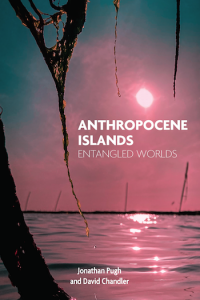In Anthropocene Islands: Entangled Worlds — available open access— Jonathan Pugh and David Chandler explore the importance of thinking with islands in the Anthropocene, showing how island thinking and practices can provide solutions to our planetary crises. This thought-provoking book delivers a loud and clear message that a research agenda for island studies is urgently needed in the Anthropocene era, writes Sibo Chen.
Anthropocene Islands: Entangled Worlds. Jonathan Pugh and David Chandler. University of Westminster Press. 2021.
 In recent years, the growing prominence of the Anthropocene in both scholarly and public discourses has been accompanied by a profound crisis of faith in Western modernity. This crisis, as Jonathan Pugh and David Chandler note in Anthropocene Islands: Entangled Worlds, demonstrates how modern frameworks of reasoning — which assume that humans have the capacity to understand ‘the world’ as a coherent, controllable and manageable object — are fundamentally flawed.
In recent years, the growing prominence of the Anthropocene in both scholarly and public discourses has been accompanied by a profound crisis of faith in Western modernity. This crisis, as Jonathan Pugh and David Chandler note in Anthropocene Islands: Entangled Worlds, demonstrates how modern frameworks of reasoning — which assume that humans have the capacity to understand ‘the world’ as a coherent, controllable and manageable object — are fundamentally flawed.
Similarly, French philosopher Jacques Derrida asserted that as faith in modern reasoning crumbles, the stark realisation that ‘there is no world, there are only islands’ becomes apparent. In the views of Pugh and Chandler, however, Derrida’s assertion must be taken seriously: what would happen if human geographers viewed islands as emblematic figures of Anthropocene thinking? This is the central question addressed throughout Anthropocene Islands.
The book’s arguments are presented in six chapters. Chapter One introduces the book’s main theoretical concerns by discussing the importance of ‘thinking with islands in the Anthropocene’. Conventional climate change narratives tend to portray islands and their inhabitants as passive and helpless victims waiting to be rescued by others. Such narratives, according to Chapter One, are closely associated with older European and modern thought that perceives islands as insular and backward in comparison to continents. The arrival of the Anthropocene not only calls into question continental reasoning’s superiority, but also allows for generative engagement with islands for alternative approaches to being (ontologies) and knowing (epistemologies).

Image Credit: Photo by Ahmed Yaaniu on Unsplash
Chapters Two and Three explore two approaches to relational ontology afforded by critical inquiries into islands: ‘Resilience’ and ‘Patchworks’. The Resilience approach emphasises how the resilient capacities of socio-ecological systems on islands challenge Western modernity’s homogenisation of various life forms under common denominators. Islands, as isolated sites dense with immanent interactions between lives, exemplify relational entanglements — a central theme addressed by many Anthropocene thinkers. The productive differentiation and individuation found on many islands thus have important implications for contemporary engagements with the Anthropocene.
By comparison, the Patchworks approach accepts the Anthropocene as a current state of humanity and explores how island thinking and practices can provide spatial and temporal solutions to planetary crises. Central to various examples of patchworks reviewed in Chapter Three is the idea that islands allow us — as subjects deeply influenced by the hegemonies of contemporary society — to reflect and appreciate our relational interconnections, thereby working collaboratively toward more sustainable human-nature relations.
Chapters Four and Five discuss how critical inquiries into islands enable two relational approaches to epistemology: ‘Correlation’ and ‘Storiation’. The authors define both approaches as onto-epistemological since they regard knowledge as intrinsic to being rather than a product of passive reflection. Echoing the previous chapters’ emphasis on relational entanglements, the Correlation approach views knowledge as being generated through experiences, practices and habits entrenched in relationships. Accordingly, when examining how islands and their inhabitants are impacted by climate change, it is imperative that scholars and policymakers prioritise correlational perspectives, recognising the global implications of island changes.
While correlations still build upon regular, reiterated patterns of interaction that are open to calculation, comparison and measurement, the relations examined by the Storiation approach are intra-actions and effects embedded in island practices. The relational richness of these practices prompts Anthropocene scholarship to engage with island imaginaries when discussing the ongoing afterlives and effects of planetary crises. Accordingly, the Storiation approach foregrounds the necessity of disrupting conceptual binaries such as subject/object and thought/being, as well as departing from the coherently graspable interrelations proposed by modernist or mainland epistemologies.
Chapter Six concludes the book by reiterating the importance of island scholarship in the Anthropocene. It makes the case that the widespread scholarly interest in islands reflects ‘the rise of non-modern, relational, non-linear and more-than-human thinking’ (34). Another key insight offered in this chapter is that relational ontologies and epistemologies should not be perceived as one homogenous ‘other’ to Western modernity. Given that relational perspectives acknowledge the coexistence of world and thought, a fruitful research agenda for alternative and non-modern approaches to the Anthropocene should embrace postmodernity’s deconstruction of the grounds for truth claims.
Anthropocene Islands outlines an ambitious agenda for researching the Anthropocene by thinking about and with islands. The book’s discussion of relational ontologies and epistemologies is thought-provoking and should be of interest to readers exploring the philosophical implications of the Anthropocene. Having said that, the book’s readability is unavoidably hampered by its challenging theoretical subjects. Additional ethnographic details about island thinking and practices could help to exemplify the complex theoretical content in Chapters Two through Five. Overall, Anthropocene Islands delivers a loud and clear message: a research agenda for island studies is urgently needed in the Anthropocene era.
- Banner Image Credit: Photo by Tengyart on Unsplash
- This review first appeared at LSE Review of Books.
Please read our comments policy before commenting.
Note: This article gives the views of the author, and not the position of USAPP – American Politics and Policy, nor of the London School of Economics.
Shortened URL for this post: https://bit.ly/3sc9wnR
About the reviewer
Sibo Chen – Ryerson University
Dr Sibo Chen is an Assistant Professor at Ryerson University’s School of Professional Communication. His research areas of interest include energy-society relations, environmental communication, critical discourse analysis, communication and identity, and instructional communication.






